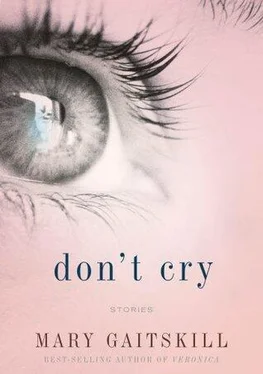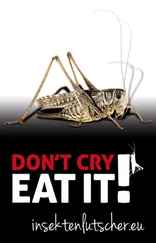“When I was there, I did a meditation with him,” said Susan.
“With him?” asked Megan. “Or at him?”
“I told him I was going to pray,” said Susan. “And we sat together in the dark.”
They were in the living room, she said, at night with the shades open so they could see the heavy snowfall. Susan went into “a light trance.” In this light trance, she “connected” with Mac as he lay on the couch, seemingly in a light trance of his own. She connected with his heart. In his heart she saw a small boy maybe five or six years old, alone in a garden. The garden was pleasant, even beautiful, but it was surrounded by a dense thicket of thorns, so that the boy could not get out and no one else could get in.
“I asked him if he wanted to come out,” said Susan. “And he just shook his head no. He was afraid. I told him I loved him and that other people out here love him, too. He looked like he was thinking about it. Then Dad got up and went to the bathroom.”
Megan sniggered. The plane picked up speed. Bea thought, Mac was six when his parents died. But she didn't say it.
Stop it, you little idiot! You little—
That child, playing on the chairs, full of hope and life. Making up a hero father whom he could be proud of, longing for him, longing to be worthy of him. Didn't the mother see? How dare you? said Megan. How dare you disrespect his service?
The plane steadily rose, but she felt as if she were falling.
Mac died in his apartment, with the girls taking care of him, or trying to. She did not spend the night there; she did not sit at his side. But during the day, she went there to be with Megan and Susan. They had a hospice nurse who monitored him, washed him, and told them how much and how often to give him morphine. The nurse's name was Henry, and they all liked him — Susan said that Mac seemed to like him, too. When he was finished upstairs, they made coffee for him, and he would sit in the living room, talking and looking at pictures of Mac when he was young. Megan showed him the picture of Mac in his army uniform, just before he shipped out. “He volunteered,” she said. “Before he was even eighteen, he signed up.”
“That's not true,” said Bea. “He was eighteen. And he only signed up because he knew he'd be drafted anyway”
Televisions came down from the ceiling in whirring rows. White-faced, Megan left the room. Henry looked at Bea, looked away. Colors flowed across the rows of dark screens, making hot rectangles, oblongs, and swirls. In the kitchen, Megan faced her, eyes glittering with tears of rage. “How dare you? How—” Bea said no to a beverage but accepted the packet of peanuts. She looked out the window, holding the nuts. The sky was bright, terribly bright, but still she felt the darkness coming. Do you remember the first time, Beatrice? How you were scared and I held you? You were so beautiful and so innocent. But you scared me a little, too, did you know that? Mac had written these things on brown grocery bags, cut to the size of notepaper to recycle and to save money He never sent them; she found them, stacks of them, when she and the girls were going through his things. We could have that passion again, I know it. Remember, Beatrice, and come back. Please, Beatrice, remember what we had.
Faces bloomed on the overhead screens, clever, warm, and ardent.
She did remember. She remembered that she had been frightened and that he had held her; that he had bruised her body with the salty spilling kisses of his sex, that each bruise bloomed with pleasure, and that pleasure filled her with its hot dissolving blossoms.
And still she couldn't cry. A stewardess came down the aisle, headphones draped gracefully over her arm. It had been two years and she had not cried for him once. The stewardess smiled and offered her draped arm. Bea shook her head and turned away into the darkness. I am old and worthless, and I am going home to shadows on the wall. Susan— Megan— She raised her fists and weakly beat upon her forehead. Why are they so far away? Why don't they have children? Why does Megan stare at me so coldly when I tell her she is beautiful?
Shadows on the wall: streetlamp, telephone wire, moths, bits of leafy branch. A pale rectangle of light. When the darkness came, these things lost their earthly meaning and became bacteria swimming in a dish or cryptic signaling hands or nodding heads with mouths that ceaselessly opened and closed, while down in the corner, a little claw pitifully scratched and scratched. Loving, conceiving, giving birth; if human love failed, it was bacteria swimming in a dish, mysterious and unseeable to itself. From a distance, it was beautiful but also terrible, and it was hard to be alone with it night after night, without even an indifferent husband lying with his warm back to you.
Hard to bear, yes. But she could bear it. She had been a child herself, and so knew the cruelty of children. She knew the strength of giving, even if you did not get what you wanted back. She had thrown her body across a deep, narrow chasm; her daughters had walked to safety across her back. They had reached the other side, and she had stood again, safe and sound herself; all was as it should be. The darkness passed. She picked up her book. And he came to her: Michael, the little boy.
He came first as a thought, a memory of his face that interrupted her reading in the middle of the second page. He had so much in his eyes, and so few words to express it. How could his mother give him the words? Or the music or pictures? She thought of him. And then she felt him. She felt him in a way she would later find impossible to describe.
“He was looking for me,” she would say to Susan some time after. “He needed me.”
But it felt more specific than that. She felt what was in his eyes, hot and seedlike and ready to unfurl. Waiting for the right stimulus, like a plant would wait for the sun. Vulnerable but vast, too, like a child in her arms.
When she told Megan, Megan surprised her by saying she'd had experiences like that, too. “But you never know,” she said, “if it's really the other person communicating with you, or if it's just your mind.”
“No,” said Bea. “It wasn't my mind. It was him. It felt just like him.”
Love me. See me. Love me. He had no words, but what he said was unmistakable.
“What did you do?” asked Susan.
“I answered him,” said Bea. “I tried, anyway. I tried so hard, I wore myself out.”
I see you, she answered. You are a wonderful boy and you will grow into a wonderful man. I love you; I love to look at you. She put her arms around him, gently, not too tight. She held him and talked to him until finally, she felt him ebb away, as if he were going to sleep. She reclined her seat and closed her eyes. Just don't get lost in the thorn garden. We need you right here. Don't go behind the thorns. A tear rolled down her cheek, and she turned her head to hide it. We need you right here.
She waited a long time to tell Megan because she was afraid of being sneered at. She waited a long time to tell Susan because she was afraid Susan would talk about the astral plane. But she didn't. She just said, “I've heard people who had abusive childhoods say they survived because they had a good experience with an adult outside the family. Even one, even if it was tiny.”
Bea opened her eyes. Before her were clouds, vast and white, their soft clefts bruised with lilac and pale gray. She wiped her eyes with her little peanut napkin. She leaned back in her seat. Good night, Mama. Closing her eyes, she remembered the sudden warmth and heaviness as Megan sat on the edge of the guest bed in the dark. She remembered her singing “The Sun, Whose Rays Are All Ablaze” from The Mikado , her voice off-key but still piercing in the dark. She sang and then bent down, and her nightgown fell open slightly as she kissed her mother good night. Beatrice crumpled the peanut napkin with an unconscious hand as she began to dream a dream that began with that kiss.
Читать дальше












